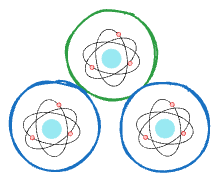Molecular notes

A molecular note is a note that contains multiple topics (or ideas) within it.
It contrasts an atomic note, which focuses on a single topic.
Tip
Use atomic notes when you want maximum flexibility and precise linking.
Use molecular notes when ideas naturally belong together and separating them would weaken their meaning.
Concept
- The metaphor comes from chemistry:
- Atoms are the smallest indivisible units.
- Molecules are combinations of atoms, originating more complex structures.
- In the same way:
- Atomic notes = minimal, single-topic notes.
- Molecular notes = richer, multi-topic notes that serve as the base unit of information.
Single atoms rarely exist in isolation; they almost always combine into molecules. Likewise, notes often make more sense when grouped into coherent clusters of meaning.
Why molecular notes?
- Contextual richness: They allow related ideas to live together.
- Practicality: Reduces fragmentation when topics are too interdependent.
- Natural structure: Mirrors how knowledge is often applied — in clusters, not in isolation.
- Base unit: Instead of always combining atomic notes, the molecule itself can be the starting point.